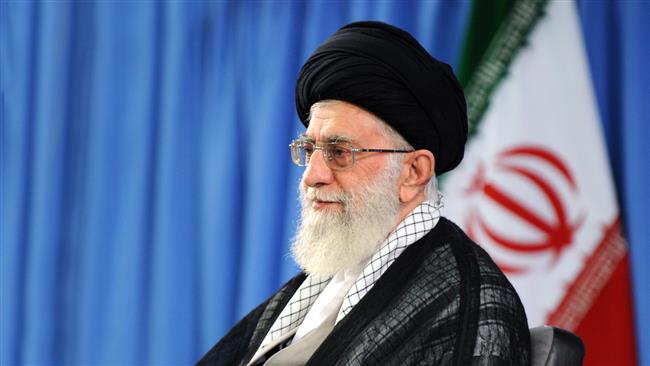PHOTO: Iran’s Supreme Leader delivers a speech in Tehran on Monday
In a speech on Monday, Iran’s Supreme Leader maintained a cautious line on domestic debate over the July 14 nuclear deal, while pointing to his concerns over Tehran’s position in Middle East crises.
Addressing Islamic broadcasters and Shia activists , Ayatollah Khamenei maneuvered carefully between the Rouhani Government and critics who are demanding a Parliamentary vote on the agreement. He said the deal “is still unsettled given the fact that neither Iran nor the US Parliaments have adopted it yet”.
The Supreme Leader did not indicate whether he was siding with the hardline position that Parliament must provide ratification, or whether he was holding the Government’s line that the Supreme National Security Council has the authority to endorse the deal.
Instead, most of his speech was a denunciation of the US and its allies, both through warnings of “sedition” inside Iran — “the opposite side in the nuclear negotiations was seeking to clinch an agreement…to find a way to infiltrate the Islamic Republic” — and a review of crises from Iraq to Syria to Yemen.
Calling for Muslim unity — these were not “holy wars”, but “political wars” fed by the West” — Khamenei declared, “We will firmly block their way. We will not allow America to make economic, political or cultural inroads into the country. We will counter such infiltration with all our power.”
The Supreme Leader’s focus on the Middle East drew attention away from the domestic debate over the nuclear agreement; however, it also betrayed worries about the regional developments. Iran can do little to ease the growing public discontent that is challenging the al-Abadi Government, even as Baghdad is facing the threat from the Islamic State. Tehran’s ally in Syria, President Assad, is in serious political and military trouble, and a Russian-Iranian initiative for political talks has been checked by Saudi Arabia.
Khamenei pointed to continued Iranian commitment in both Iraq and Syria as essential, by linking them on the frontline of the Islamic Republic’s security: “If Iraq disintegrates, then Syria is the main goal of our enemies.”
Americans also try to penetrate into region. They want to disintegrate #Iraq & #Syria. We do not allow this and it won’t happen by God help.
— Khamenei.ir (@khamenei_ir) August 17, 2015
He assured the audience that Tehran will prevail, both at home and abroad: “In the past 35 years the Islamic Republic has always been the target of threats, sanctions…and various political conspiracies….[Iran] is accustomed to the pressure.”
High-level officials put out statements supporting Khamenei’s line over the Middle East. The Supreme Leader’s top aide, Ali Akbar Velayati, said the demand for Syria’s Assad to step aside was “irrational“. He claimed that the President and the Syrian nation have withstood “the avarice of America” and “reactionary regional countries” for four years without allowing the “axis of resistance” to be broken.
The head of judiciary, Sadegh Larijani — explaining that the teachings of Imam Khomeini and the Supreme Leader identified the “Great Satan” as “the true evil” — said the US will try to “modify and change” Iran following the nuclear agreement. Considering the region, he said Iran had failed by not providing “much materially” to the Ansar Allah (Houthi) movement in Yemen to resist Saudi-led intervention.
Under Fire at Home, Former Iraqi Prime Minister al-Maliki Visits Tehran
Facing criticism and even prosecution at home, former Iraqi Prime Minister Nuri al-Maliki has been holding high-level talks in Tehran.
Al-Maliki met the Supreme Leader’s top aide, Ali Akbar Velayati, and 1st Vice President Eshagh Jahangiri on Monday. He used the occasions to blame Turkey and Iraqi Kurdistan for the advance of the Islamic State, which cost al-Maliki his job — reportedly after Iran withdrew its support for him — last August.
“The fall of Mosul [to the Islamic State last June” was the result of the plots hatched in Ankara and Erbil,” he declared.
Earlier this week, an Iraqi Parliamentary committee included al-Maliki in a list of officials to be investigated, with possible prosecution, for their part in the defeat by the Islamic State.
The former Prime Minister responded that political differences had caused the committee to fail to see the underlying causes of the militants’ victories: “The veracity and truthfulness of the investigation is also in serious doubt.”
Al-Maliki praised his hosts, “The Islamic Republic of Iran resembles the camp for the pious believers and its appropriate and exalted status and achievements, too, are achieved in its unsparing campaign against the arrogant world powers.”

